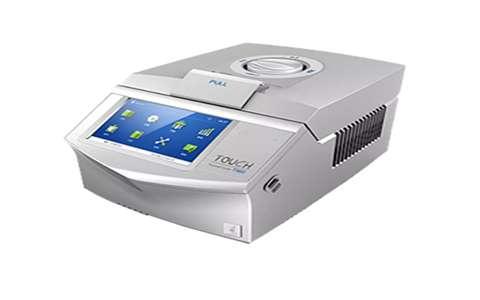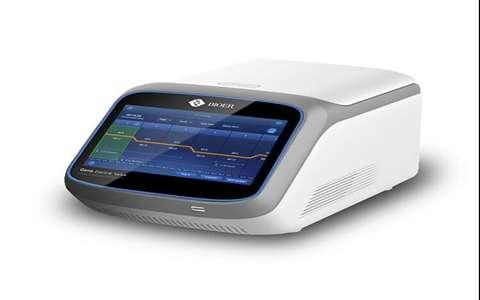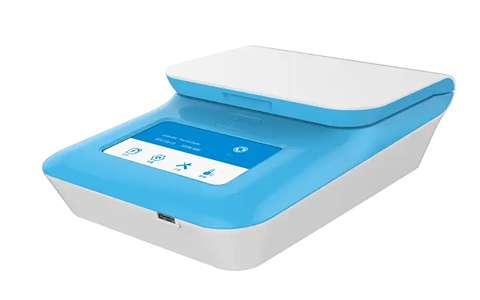Polymerase Chain Reaction (PCR) has become an indispensable tool in various fields of biology, from molecular diagnostics to genetic research.
.
 However, conventional thermal cyclers have limitations, such as manual monitoring and control, limited sample capacity, and the potential for human error.
However, conventional thermal cyclers have limitations, such as manual monitoring and control, limited sample capacity, and the potential for human error.
Enter the smart thermal cycler – a game-changing innovation that automates and streamlines the PCR process.
In this article, we will explore the world of smart thermal cyclers, their benefits, and their potential in advancing scientific research.
Automating the PCR Process: One of the key advantages of smart thermal cyclers is their ability to automate the PCR process.
By incorporating advanced sensors and algorithms, these devices can monitor and control the entire PCR reaction, from denaturation to amplification and annealing, without the need for constant human intervention.
This eliminates the risk of errors and allows researchers to focus on other important tasks.
Enhancing Workflow Efficiency: Smart thermal cyclers are designed to enhance workflow efficiency, enabling researchers to save time and resources.
With their intuitive user interfaces, they offer real-time monitoring of reaction parameters, automated data collection, and integration with laboratory information management systems (LIMS).
This integration allows for seamless data transfer and analysis, reducing the chances of human error and expediting results interpretation.
Automating the PCR Process: One of the key advantages of smart thermal cyclers is their ability to automate the PCR process.
By incorporating advanced sensors and algorithms, these devices can monitor and control the entire PCR reaction, from denaturation to amplification and annealing, without the need for constant human intervention.
This eliminates the risk of errors and allows researchers to focus on other important tasks.
Enhancing Workflow Efficiency: Smart thermal cyclers are designed to enhance workflow efficiency, enabling researchers to save time and resources.
With their intuitive user interfaces, they offer real-time monitoring of reaction parameters, automated data collection, and integration with laboratory information management systems (LIMS).
This integration allows for seamless data transfer and analysis, reducing the chances of human error and expediting results interpretation.
..
 Remote Monitoring and Control: With the advancements in connectivity, smart thermal cyclers offer the ability to remotely monitor and control experiments.
Remote Monitoring and Control: With the advancements in connectivity, smart thermal cyclers offer the ability to remotely monitor and control experiments.
Researchers can access and control their PCR reactions from anywhere utilizing web-based interfaces or dedicated mobile applications.
This feature proves particularly useful for collaborative research projects, where real-time monitoring and adjustments can be made remotely, ensuring smoother collaborations and faster data sharing.
Intelligent Data Analysis: Another valuable feature of smart thermal cyclers is their ability to perform intelligent data analysis.
By employing algorithms and machine learning, these devices can analyze PCR results in real-time, flagging any inconsistencies or anomalies.
This proactive approach helps researchers identify potential issues early on, allowing for corrective measures before proceeding with subsequent experiments.
Conclusion: The advent of smart thermal cyclers has revolutionized the field of PCR, enhancing workflow efficiency, reducing human error, and improving experimental flexibility.
The ability to automate and remotely monitor PCR reactions, coupled with intelligent data analysis capabilities, offers researchers a more streamlined and efficient approach to their work.
It is evident that smart thermal cyclers have the potential to accelerate scientific discoveries, drive innovation, and open up new avenues for research in various disciplines of biology.
As technology continues to evolve, we can expect these devices to become an indispensable tool for scientists worldwide.
As the demand for faster and more accurate PCR results grows, the smart thermal cycler is poised to become the go-to tool in laboratories around the world.
Its ability to automate and streamline the PCR process not only saves time and resources but also reduces the chances of human error, ensuring the reliability of experimental results.
…
 With its intelligent data analysis capabilities, the smart thermal cycler allows researchers to gain deeper insights from their PCR experiments.
With its intelligent data analysis capabilities, the smart thermal cycler allows researchers to gain deeper insights from their PCR experiments.
By analyzing data in real-time and flagging any inconsistencies or anomalies, researchers can make data-driven decisions and fine-tune their experimental parameters.
This iterative process accelerates the research cycle and brings us closer to scientific breakthroughs.
Furthermore, the remote monitoring and control features of smart thermal cyclers have become increasingly important in today’s globalized research landscape.
With collaborations taking place across different time zones and geographic locations, the ability to access and control experiments remotely provides researchers with unprecedented flexibility and convenience.
Real-time adjustments can be made, ensuring that experiments proceed smoothly and efficiently.
The advantages of the smart thermal cycler extend beyond the research laboratory.
In molecular diagnostics, where accuracy and speed are crucial, the automation and intelligent data analysis capabilities of these devices play a vital role.
The ability to rapidly process large volumes of patient samples with minimal human intervention reduces turnaround time and improves diagnostic accuracy.
The adoption of smart thermal cyclers in industries such as pharmaceuticals and agriculture will also contribute to accelerated research and development.
With the ability to quickly optimize PCR conditions and perform multiplexing, researchers can efficiently screen potential drug candidates or genetically characterize crops, leading to faster product development and improved yields.
In conclusion, the introduction of smart thermal cyclers has revolutionized the field of PCR by automating and streamlining the process, enhancing workflow efficiency, and minimizing human error.
With the added benefits of remote monitoring and control, intelligent data analysis, and experimental flexibility, these devices are set to become an essential tool in scientific research, molecular diagnostics, and industrial applications.
As the technology continues to evolve, we can expect further advancements in smart thermal cycler capabilities and their integration into laboratory workflows, enabling groundbreaking discoveries and advancements in the biological sciences.



